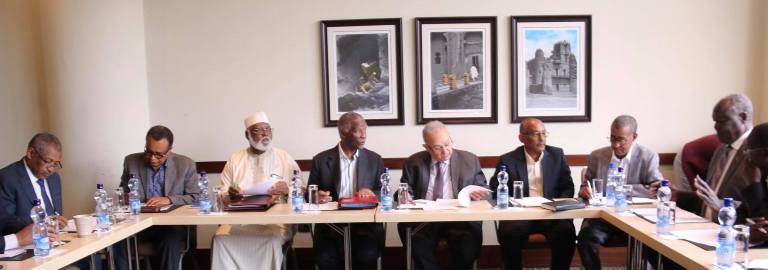Sudan, South Sudan to fully activate buffer zone by end of February

February 4, 2018 (KHARTOUM) – The Joint Political and Security Mechanism (JPSM) Sunday agreed to finalize the activation of the Safe Demilitarized Border Zone (SDBZ) between Sudan and South Sudan and decided withdraw any remaining troops by the end of the month.
In a meeting held in Addis Ababa brokered by the African Union High-Level Implementation Panel with the participation of UNISFA, the JPSM held a meeting in Addis Ababa to discuss the ongoing operationalization of the SDBZ, border monitoring operations, and the crossing border points.
The two delegations headed by South Sudanese Defence Minister Kuol Manyang Juuk and Chief of Joint Staff of the Sudan Armed Forces Emad al-Din Adawi mentioned the improvement of the security situation on the over 2000 km joint border after years of accusations of support to rebel groups from both sides.
A statement released by the AUHIP said the meeting decided o finalise the “redeployment of forces outside the SDBZ by the end of February 2018”.
In its briefing to the meeting, the UNISFA said that redeployment had not taken place in eight locations within the SDBZ, while the Sudanese side reported the presence of unknown forces in nine locations north of the SDBZ and “relayed” the information to the South Sudanese minister.
The South Sudanese government “will investigate the allegations made by Government of Sudan (GoS) on the presence of unknown forces in nine locations north of the SDBZ and respond to these allegations within ten days,” further said the statement.
It was also agreed that the joint border monitoring team (JBVMM) has to provide photographic imagery of the eight locations along with their coordinates to both Parties within two weeks.
For its part, the South Sudanese delegation committed to redeploying its forces from Teshwin by 12 February 2018.
In May 2017, the United Nations Security Council (UNSC) decided to reduce UNISFA troops and warned it may withdraw its support to the Sudan-South Sudan border monitoring force if they continue to impede the activation of the operation.
The buffer zone and other security arrangements have been agreed since September 2012 but its operationalization had been stopped despite several attempts by the AUHIP to encourage the parties to enforce the deal. The latest were two deals signed in October 2015 and June 2016.
The meeting further agreed to begin the Phase 1 of the border crossing corridors and the establishment of customs and immigration check-points. Therefore it was decided that the Joint Technical Border Corridors Committee (JTBCC) will meet on 19 February 2018 in Khartoum.
Furthermore, the parties discussed the issue of 14 Mile Area which delayed the activation of the buffer zone for long-time because the Malwal Dinka refused that the disputed area be part of the SDBZ and the former chief of army staff Paul Malong Awan used his influence to stop the whole operation in November 2013.
The meeting agreed to activate the Ad-Hoc Committee for the 14 Mile Area and tasked UNISFA with the organisation of the first meeting of the Committee on 19 February 2018 at the Safoha/Kiir,Adim team site.
“This meeting will also address the challenges faced by UNISFA in acquiring land for the ream sites in Safahn/Kiir-Adim and Teshwin,” further said the statement.
(ST)
